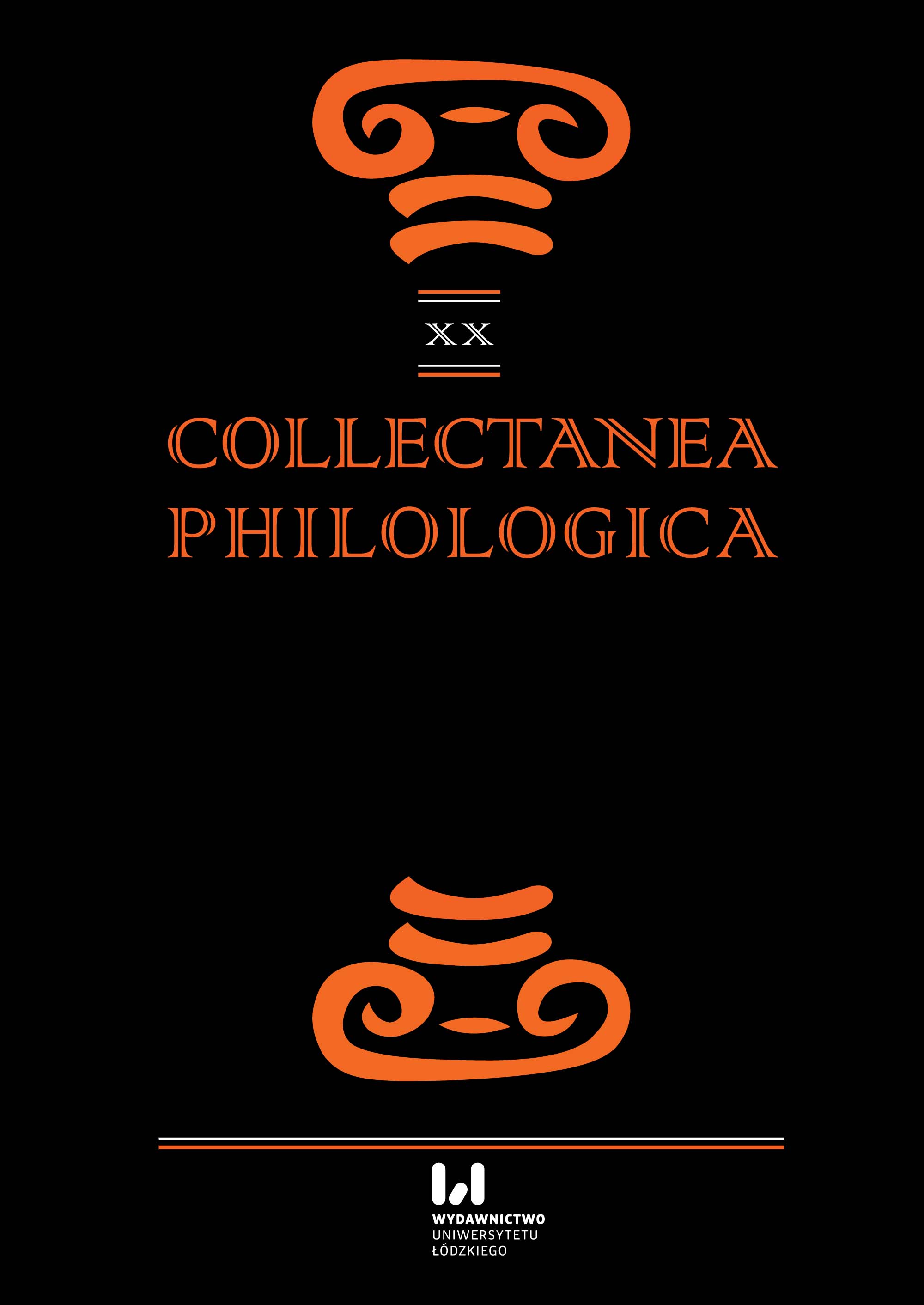Obraz Achillesa i Hektora w poezji rzymskiej. Prolegomena
DOI:
https://doi.org/10.18778/1733-0319.20.05Słowa kluczowe:
Hector, Achilles, Roman literatureAbstrakt
-
Bibliografia
Ahrensdorf, P. (2014). Homer on the Gods and Human Virtue: Creating the Foundations of Classical Civilization. Cambridge: Cambridge University Press.
Google Scholar
Anthologia latina, sive poesis latinae supplementum. (1906). F. Bücheler, A. Riese (eds.). Leipzig: B. G. Teubner.
Google Scholar
Ausonius (1919). Epitaphia heroum qui bello Troico interfuerunt. W: Ausonius. T. E. Capps et al. (eds.). Loeb Classical Library. London: W. Heinemann.
Google Scholar
Bassett, S. (1933). “Achilles’ Treatment of Hector’s Body”. Transactions and Proceedings of the American Philological Association. Vol. 64, 41–65.
Google Scholar
Brill’s New Pauly: encyclopaedia of the ancient world: Antiquity. (2002). Vol. I. Leiden; Boston: Brill.
Google Scholar
Brill’s New Pauly: encyclopaedia of the ancient world: Antiquity. (2005). Vol. VI. Leiden; Boston: Brill.
Google Scholar
Clark, R. (2007). Dido’s Moment of Death as a Cosmic Event in Vergil’s Universe. W: P. Granoff, K. Shinohara, (eds.). Heroes and Saints: The Moment of Death in Cross-cultural Perspectives. Newcastle: Cambridge Scholars Publishing. 261–284.
Google Scholar
Friedrich, A. (2002). Das Symposion der XII Sapientes. Berlin–New York: Walter de Gruyter.
Google Scholar
Gossage, A. (1955). “Two Implications of the Trojan Legend”. Greece & Rome, Vol. 2, No. 1, 23–29.
Google Scholar
Grafton, A. et al. (eds.) (2010). The Classical Tradition. Cambridge, Massachusetts, London: The Belknap Press of Harvard University Press.
Google Scholar
Henry, J. (1878). Aeneidea, or critical, exegetical, and aesthetical remarks on the Aeneis. Vol. II. Dublin: Trustees of the Author.
Google Scholar
Heyworth, S. (2007). Cynthia: A Companion to the Text of Propertius. Oxford: Oxford University Press.
Google Scholar
Homer (1999). Iliada. Przeł. K. Jeżewska. Warszawa: Prószyński i S-ka.
Google Scholar
Horatius, Q. (1881). Carmina. L. Mueller (ed.). Leipzig: B. G. Teubner.
Google Scholar
Knight, W. (1932). “Magical Motives in Seneca’s Troades”. Transactions and Proceedings of the American Philological Association, Vol. 63, 20–33.
Google Scholar
Levin, S. (1949). “Love and the Hero of the Iliad”. Transactions and Proceedings of the American Philological Association, Vol. 80, 37–49.
Google Scholar
Murgatroyd, P. et al. (eds.) (2017). Ovid’s Heroides: A New Translation and Critical Essays. Abingdon, New York: Routledge.
Google Scholar
Musgrove, M. (1997). “Change of Perspective in Ovid, Metamorphoses 12.11–23”. The American Journal of Philology, Vol. 118, No. 2, 267–283.
Google Scholar
Norton, E. (2013). Aspects of Ecphrastic Technique in Ovid’s Metamorphoses. Newcastle Upon Tyne: Cambridge Scholars Publishing.
Google Scholar
O’Brien, J. (1994). Alexander the Great: The Invisible Enemy: a Biography. London: Routledge.
Google Scholar
Ovid (1914). Heroides. Amores. Revised by G. P. Goold. Loeb Classical Library. Cambridge, MA: Harvard University Press.
Google Scholar
Ovid (1916). Metamorphoses. Revised by G. P. Goold. Vol. II. Loeb Classical Library. Cambridge, MA: Harvard University Press.
Google Scholar
Ovid (1939). Tristia. Ex Ponto. Revised by G. P. Goold. Loeb Classical Library. Cambridge, MA: Harvard University Press.
Google Scholar
Owidiusz (1986). Heroidy. Przeł. W. Markowska. Kraków: Wydawnictwo Literackie.
Google Scholar
Owidiusz (1995). Metamorfozy. Przeł. A. Kamieńska i S. Stabryła. Wrocław: Ossolineum.
Google Scholar
Papaioannou, S. (2007). Redesigning Achilles. ‘Recycling’ the Epic Cycle in the ‘Little Iliad’ (Ovid, Metamorphoses 12.1–13.622). Berlin: Walter de Gruyter.
Google Scholar
Privitera, T. (2015). „Intersezioni: Ausonio e l’Anthologia Latina”. AL. Rivista di studi di Anthologia Latina 6. 3–20.
Google Scholar
Propertius, S. (1880). Elegiarum libri IV. A. Palmer (ed.). Londinii: G. Bell, Dublini: E. Ponsonby.
Google Scholar
Schneider, R. (2012). The making of Oriental Rome: shaping the Trojan legend. W: P. Bang, D. Kołodziejczyk, (eds.). Universal Empire: A Comparative Approach to Imperial Culture and Representation in Eurasian History. Cambridge–New York: Cambridge University Press. 76–129.
Google Scholar
Scott, J. (1913). “Paris and Hector in Tradition and in Homer”. Classical Philology, Vol. 8, No. 2, 160–171.
Google Scholar
Seneca, L. (1921). Tragoediae. R. Peiper, G. Richter, (eds.). Leipzig: B. G. Teubner.
Google Scholar
Seneka, L. (2003). Troas: Tragedyja z Seneki. Przeł. Ł. Górnicki. Kraków: Universitas.
Google Scholar
Smith, S. (1999). “Remembering the Enemy: Narrative, Focalization, and Vergil’s Portrait of Achilles”. Transactions of the American Philological Association, Vol. 129, 225–262.
Google Scholar
Strabo. (1877). Geographica. A. Meineke (ed.). Leipzig: B. G. Teubner.
Google Scholar
Tilroe, W. (1939). The Ilias Latina: A Study of the Latin Iliad, Including Translation, Commentary, and Concordance. Los Angeles: University of Southern California Libraries.
Google Scholar
Vergilius, P. (1904). Aeneis. O. Ribbeck (ed.). Leipzig: B. G. Teubner.
Google Scholar
Wergiliusz (1981). Eneida. Przeł. T. Karyłowski. Wrocław: Ossolineum.
Google Scholar
Woods, M. (2016). Experiencing the Classics in Medieval Education. W: R. Copeland, (ed.). The Oxford History of Classical Reception in English Literature. Vol. 1 (800–1558). Oxford: Oxford University Press. 35–52.
Google Scholar












